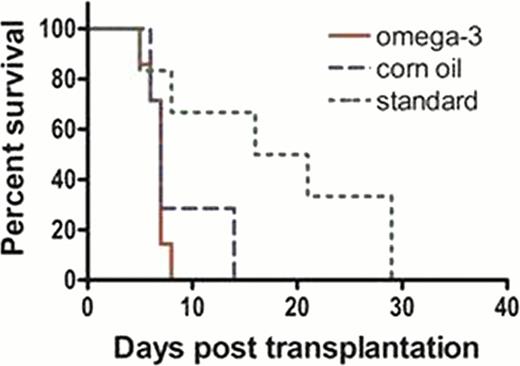Abstract
Abstract 4671
Omega-3 has been reported to enhance the effects of some cancer chemotherapeutic agents and to play a role in the immune system as immunoregulator and immunosuppressant. The effect of a diet rich in omega-3 during immunosuppressed states of anticancer treatment and on bone marrow transplantation (BMT) outcome is not well known.
To study the effect of omega-3 on busulfan-cyclophosphamide (Bu-Cy) conditioning regimen. Moreover, to evaluate the effect of omega-3 on the outcome of BMT after Bu-Cy conditioning.
We evaluated the effects of menhadenfish oil (omega-3 rich) on the myeloablative treatment with Bu-Cy as well as on the outcome of BMT in mice compared to the effects of a diet containing corn oil (omega-6 rich) or to standard chow.
Animals were divided into three groups, Group 1, Group 2 and Group 3. In all the groups, female BALB/c mice, 8–12 weeks old, were randomly selected to receive a diet enriched with fish oil, a diet enriched with corn oil or standard chow. The mice were fed for two weeks prior to conditioning. Thereafter, all the mice were injected IP with 80 mg/kg busulfan (Bu) for four days (day –7 to day –4) followed by 200 mg/kg cyclophosphamide (Cy) for two days (days –3 and −2). The mice in groups 1 and 2 were killed on day 0 (the proposed day for transplantation) and spleen and femur bone marrow cells were harvested. Organs were analysed with flow cytometry to evaluate the lymphoid and myeloid cells phenotype. Also, regulatory T cell number and function were studied. Mice in Group 3 were transplanted on day 0 with allogeneic bone marrow cells from 8–12 weeks old male C57BL/6 mice (2.0 × 107 bone marrow cells and 3.0 × 107spleen cells).
Fish oil-enriched chow significantly suppressed the function (Figure 1) of CD4+CD25+FoxP3+ regulatory T (Treg) cells compared to standard chow and corn oil fed mice at day 0. However, the percentage of FoxP3+ cells was significantly elevated in mice fed corn oil compared to standard chow. In concert with myeloablative chemotherapy, fish oil enhanced the suppressive effect of Bu-Cy on CD11b+ myeloid and CD11c+CD86+ dendritic cell populations in the bone marrow and spleen compared to the other dietary groups.
Recipient mice fed fish oil had lower survival after BMT (Figure 2). A higher survival was observed for corn oil-fed recipients, but this survival rate was still inferior to that of recipients fed standard chow. Feeding recipients omega-3 enriched diet was associated with a more pronounced acute graft versus host disease (aGVHD). BM and spleen from mice fed corn oil demonstrated lower chimerism.
Fish oil enhances the immunosuppressive effect of the conditioning regimen (Bu-Cy) in mice. BMT recipients fed a diet rich in polyunsaturated fatty acids either have lower engraftment (corn oil) or react with a lethal aGVHD (fish oil) associated with a suppression of Treg cells. These findings may have clinical implications. PUFA supplementation should be reconsidered and caution is advised in patients undergoing stem cell transplantation.
Mixed lymphocyte reaction assay to study the regulatory T cell function. The ratio between the responder cells and Treg cells was 1 to 0.5. The stimulator was anti-CD3 in 3μg/ml and 10μg/ml.
Mixed lymphocyte reaction assay to study the regulatory T cell function. The ratio between the responder cells and Treg cells was 1 to 0.5. The stimulator was anti-CD3 in 3μg/ml and 10μg/ml.
Survival curve after SCT in mice received Bu-Cy conditioning and fed omega-3, corn oil or standard food.
Survival curve after SCT in mice received Bu-Cy conditioning and fed omega-3, corn oil or standard food.
No relevant conflicts of interest to declare.
Author notes
Asterisk with author names denotes non-ASH members.



This feature is available to Subscribers Only
Sign In or Create an Account Close Modal